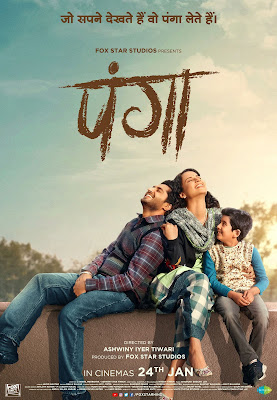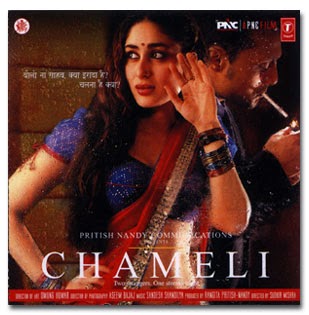REVIEW: PANGA
 Cast: Kangana Ranaut, Richa Chaddha, Jasdeep Singh Gill, Yagya Bhasin
Cast: Kangana Ranaut, Richa Chaddha, Jasdeep Singh Gill, Yagya BhasinDirector: Ashwiny Iyer Tiwari
Rating: 4/5 ****
Panga is a light-hearted realistic movie that engages the reality of all kinds of audiences, while still being filled with adrenaline and humour. The movie is a true entertainer with honest performances, extremely well-written dialogue and witty scenes to engage you instantly. The movie deserves special appreciation because it never becomes heavy or burdensome.
The STORYLINE immediately grabs the attention of the audience with hen-pecked marital humour and the humour of motherhood. The first several scenes open to reveal the love of a happily married couple and their child (Bhasin). Showcasing wonderful montages of the relationship between a mother, Jaya, (Ranaut) and her child, Adi, the movie comfortably moves into the crux of the story.
With jokes said in jest by Adi (Bhasin) the movie lingers on the heaviness of a mother's history as a sportswoman. Here is inserted a well-made song montage of Ranaut's glory days as a Kabaddi player and meeting the love of her life, Prashant (Singh-Gill). Quirky and funnily the song montage zooms into a marriage followed by an accidental pregnancy. Ranaut is offered a spot on the national team just before she realises her pregnancy.
Hopeful that she may return to her sport postpartum, Jaya waits to greet her coaches and lingers around the training grounds. Further complications arise when Jaya's child is born pre-mature and said to have some unexplained immune deficiency, which would require extra attention and care. There is a beautiful moment of Jaya promising to her newborn child that she will take care of him and somehow with the unseen responsibility of raising a child forgets her sport and her passion.
 Returning to the present, the seven-year-old child coerces his father to convince Jaya to take up her sports again and make a 'comeback'. Incidentally, the domino to this entire sequence, Jaya's ex-teammate and best friend, Meenu Singh, (Chaddha) along with the efforts of the child Adi allows Jaya to reimagine herself as a sportswoman, capable of re-entering the world of competitive sport.
Returning to the present, the seven-year-old child coerces his father to convince Jaya to take up her sports again and make a 'comeback'. Incidentally, the domino to this entire sequence, Jaya's ex-teammate and best friend, Meenu Singh, (Chaddha) along with the efforts of the child Adi allows Jaya to reimagine herself as a sportswoman, capable of re-entering the world of competitive sport.
With training and hard work, and most importantly her reignited dedication, Jaya finds herself auditioning to be on the team of Eastern Railway. On realising that to be on the team Jaya needs to relocate to another city and leave her child behind, the movie showcases (perhaps) the most important scene of Jaya's dilemma. Jaya confesses to Meenu that she only attempted to try-out for the team to test her limits and can never leave her child since that would allow her to have her own dreams, a right she does not have. Jaya calls herself selfish and precisely expresses the guilt and dilemma most women face while considering to restart their careers.
Through a subtle argument, Jaya tests whether her husband is ready to deal with the workload of household chores and being a parent. This becomes the only piercing and stark moment when Jaya blames her husband and child. Subsequently, Jaya is again coerced by her borderline-flippant husband, Prashant, to go and train in Kolkata
Jaya meets her much younger roommate in the hostel she has to relocate to and begins her intense training, qualifying for more advanced levels of the sport. Conveniently, after a selection session, a journalist airs the story of Jaya Nigam's comeback and hopes of achieving more in the field of Kabaddi. With even more unbelievable convenience the media decides to take this comeback story seriously and culminates with a conference of suited men deciding to fall into media pressure to give Jaya a spot as a substitute.
Further on, as an International Kabaddi competition progresses Jaya's family comes to support her and is disappointed when they see that she hasn't been allowed to play. Burdened with the pressure of keeping her son's dream alive (to watch his mom play and bring to fruition the family sacrifice) and of being a team player Jaya is shown getting irked. Finally, despite an unexplained vendetta, the team captain brings Jaya into the match. The predictable climax witnesses Ranaut pull a stunt to bring her team to victory.
The PERFORMANCES are subtle and deeply layered. Each of the characters comes out as likeable and relatable, but most importantly, honest.
Jaya Nigam portrayed by Kangana Ranaut has the most footage and performs the role with subtle liveliness (much like her performance in Queen). Kangana uses her quivering and weak voice to an advantage, in a role where being strong and persistent is juxtaposed with being understanding and sacrificial. Her portrayal of Jaya has moments of flakiness but usually resounds thoroughly as relatable and honest. Her beautiful curls are used particularly well to frame her face aesthetically and keep the character likeable. The only drawback of her performance is a slight hesitation and at times forced emoting. Kangana has never been afraid to look ugly and her voicing in the film is particularly stronger than her previous roles. However, Kangana manages to capture the mirth and self-doubt of the character with ease.
Jasdeep Singh Gill is perhaps the worst in the midst of brilliant actors. His character portrayal remains unsure of the character's desires. He comes off as likeable, yet there are moments of intense distaste towards his reasoning and in this way becomes a false-antagonist. His biggest strength is his voice and delivery of dialogue, perhaps due to his musical background. Each thing he says sounds believable and comfortable. Special mention must be made of the attention to detail that is followed as Singh-Gill's hairstyle changes from young to old.
Yagya Bhasin plays the child Adi with innocence and ease. Bringing comic relief and child-like expectation in his conversations. There is a flare of self-assurance which makes the child actor particularly likeable and humorous.
 Richa Chadda as Meenu provides several scenes of wittiness and comic-relief. Her strong-headed portrayal of Meenu emphasises the weak will and self-doubt of Jaya. In that, Chaddha becomes a pillar for Kangana to rely on, the same way that Jaya relies on Meenu. Chadda's bindaas flamboyance reiterate the will of the movie, saying everything that the audience hopes to say confidently.
Richa Chadda as Meenu provides several scenes of wittiness and comic-relief. Her strong-headed portrayal of Meenu emphasises the weak will and self-doubt of Jaya. In that, Chaddha becomes a pillar for Kangana to rely on, the same way that Jaya relies on Meenu. Chadda's bindaas flamboyance reiterate the will of the movie, saying everything that the audience hopes to say confidently.The DIALOGUE is strong and witty, with repeated emphasis on sacrifice and an underlayer of blame-game. Comic-relief and humour are particularly strong in the writing.
The COSTUMES weave the world of small-town India and the cosy atmosphere for the movie to continue. There are moments when simple colours are used to portray teams, which alas, is the plight of any sport-centred movie.
On the whole, Panga fails only because of its emphatic reiteration of sacrifice and dreams but remains light-hearted and mirthful throughout. The importance of the movie is the fun-spirited approach to women's achievements and possibilities and in that it becomes feminist. Struggles and vulnerabilities are subtly showcased layering the movie for a pivotal real-world plausibility. The pace of the movie is comfortable and eases the audience, almost like a mother's guiding hand preparing for what is to come next.
***
On the whole, Panga fails only because of its emphatic reiteration of sacrifice and dreams but remains light-hearted and mirthful throughout. The importance of the movie is the fun-spirited approach to women's achievements and possibilities and in that it becomes feminist. Struggles and vulnerabilities are subtly showcased layering the movie for a pivotal real-world plausibility. The pace of the movie is comfortable and eases the audience, almost like a mother's guiding hand preparing for what is to come next.




Comments
Post a Comment